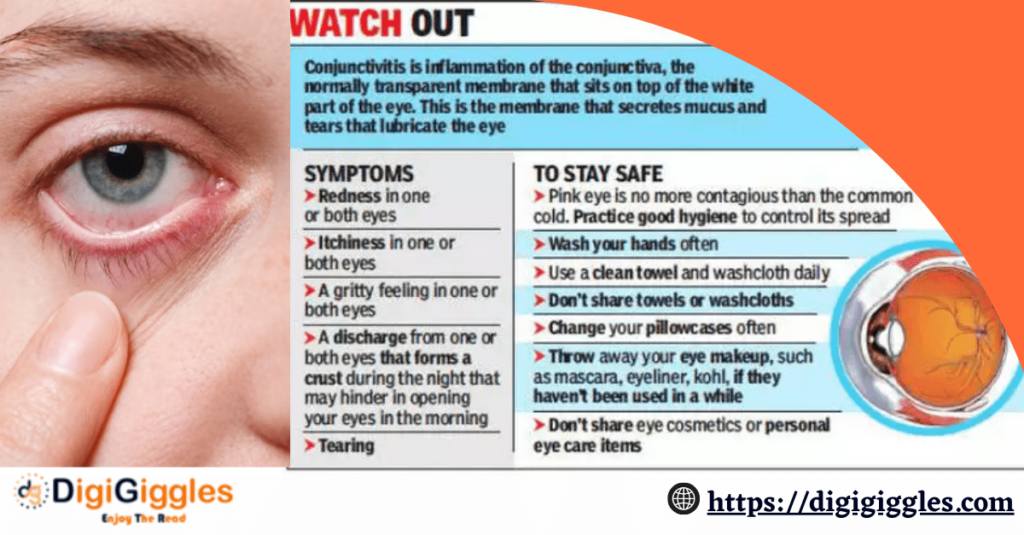Hospital Outpatient Departments (OPDs) are witnessing a substantial influx of patients with pink and watery eyes. Medical professionals are observing a threefold rise in cases compared to the usual average, with patients exhibiting symptoms like redness, swelling, and difficulty in eye-opening.
In the past ten days, a majority of the population has been complaining about eye infections. The stated primary reason is the rise in humidity levels in the city.
Additionally, the crossing of the dangerous water level mark by the Yamuna River has led to a rise in cases of conjunctivitis in Delhi and certain areas of Gujarat. This increase comes after a prevalence of monsoon-related illnesses like dengue and malaria.
A large number of patients with pink and watery eyes have been converging on hospital Outpatient Departments (OPDs).
According to Dr Prashaant Chaudhry, an ophthalmologist at Aakash Healthcare, this year’s eye infection seems to be more aggressive. Most major government and private hospitals are recording 15-20 cases per day, which is three times higher than the typical number of cases.
Dr. Chaudhry remarked, that this time, the infection has been more severe, presenting with membrane formation and even haemorrhages (blood spots).
According to Dr Vandana Khullar, a senior eye consultant at PSRI Hospital, the current eye infection is notably severe, impacting both eyes and leading to intense symptoms such as pronounced swelling, difficulty in eye-opening, eye pain, and highly red eyes.
What is conjunctivitis, commonly known as pink eye?
Conjunctivitis, or pink eye, refers to the inflammation or infection of the clear membrane that covers the eyelid and eyeball.
This condition can be caused by various factors, including viral or bacterial infections, allergies, and environmental irritants.
Bacterial conjunctivitis specifically occurs when bacterial pathogens infect the eye’s conjunctiva. The recent increase in cases might be influenced by factors like changes in weather conditions, hygiene practices, or the emergence of antibiotic-resistant strains.
Dr Vandana Khullar explained, “Patients are seeking eye clinics due to significant eye discomfort and the prolonged duration of the illness. In some cases, both antibiotic eye drops with anti-inflammatory properties and oral antibiotics are necessary for treatment.”
To effectively manage and curb the further spread of bacterial conjunctivitis, it is crucial to prioritise proper education on hygiene practices, early detection, and the appropriate use of antibiotics.
Tips for Protecting Yourself from Conjunctivitis:
- Prioritise good hygiene by frequently washing your hands with soap and warm water for at least 20 seconds, particularly before and after touching your eyes or applying eye drops.
- Refrain from touching or rubbing your eyes to prevent exacerbating the condition or spreading it to the other eye.
- If you have conjunctivitis, make sure to cleanse any discharge around your eyes multiple times a day using a clean, wet washcloth or fresh cotton ball.
- Avoid sharing personal items like pillows, washcloths, towels, eye drops, eye or face makeup, makeup brushes, contact lenses, contact lens storage cases, or eyeglasses. These items can harbour viruses or bacteria and contribute to the spread of infection.
- Change your pillowcases frequently and wash them in hot water with detergent. One should use a fresh towel and washcloth daily.
- For contact lens wearers, ensure proper cleaning of your lenses. Inadequately cleaned lenses can lead to bacterial conjunctivitis. If you currently have conjunctivitis, refrain from wearing your contact lenses until your eye doctor approves their use again.
- Maintain a healthy diet that includes foods rich in vitamins A and C, as they are particularly beneficial for strong and infection-resistant eyes.
- Schedule regular eye check-ups to detect any potential eye problems early and prevent their progression.
- If you suffer from allergic conjunctivitis, take measures to avoid exposure to the allergen responsible for the reaction. Allergic conjunctivitis is treated using allergy eye drops.
- If you come into contact with someone who has conjunctivitis, take extra precautions to prevent infection. Frequent handwashing and avoiding close contact with the infected person are essential steps in safeguarding yourself.
What is the reason for the current need for antibiotics?
The increased prevalence of bacterial causes necessitates the use of antibiotics this time. Normally, conjunctivitis resolves on its own. However, due to the current strain being more aggressive, the use of antibiotics becomes necessary.
According to Dr Prashaant Chaudhry, employing antibiotics aids in reducing the infection’s duration, lessening its severity, and preventing potential complications. Nonetheless, it is vital to exercise prudent use of antibiotics to minimize the risk of antibiotic resistance and preserve their effectiveness.
